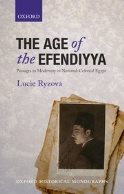|
The Age of the Efendiyya: Passage to Modernity in National-Colonial Egypt
|
|
Lucie Ryzova
|

|

In colonial-era Egypt, a new social category of “modern men” emerged, the efendiyya (sg. efendi). Working as bureaucrats, teachers, journalists, free professionals and public intellectuals, the efendis represented new middle class elites. They were the experts who drafted and carried out the state’s modernisation policies, and the makers as well as majority consumers of modern forms of politics and national culture. As simultaneously “authentic” and “modern,” they assumed key political role in the anti-colonial movement and in the building of a modern state both before and after the revolution of 1952. This book tells the story of where did these self-consciously modern men come from, and how did they come to be through multiple social, cultural, and institutional contexts. These contexts included social strategies pursued by “traditional” middling households responding to new opportunities for social mobility; modern schools as (non-exclusive) vehicles for new forms of knowledge opening possibilities to redefine social authority; but they also included new forms of youth culture, student rituals and peer networks, as well as urban popular culture writ large.
Through these contexts, a historically novel experience of being an efendi emerged. New social practices (politics, or writing) and new cultural forms and genres (literature, autobiography) were its key sites of self-expression. Through these venues, an efendi culture imbued with a sense of mission, duty, and entitlement was articulated, and defined against and in relation to two main contrastive others: “traditional” society and western modernity-cum-colonial authority. Both represented the efendis’ social, cultural and political nemeses, who, in some contexts, could also become his allies.
|
|
